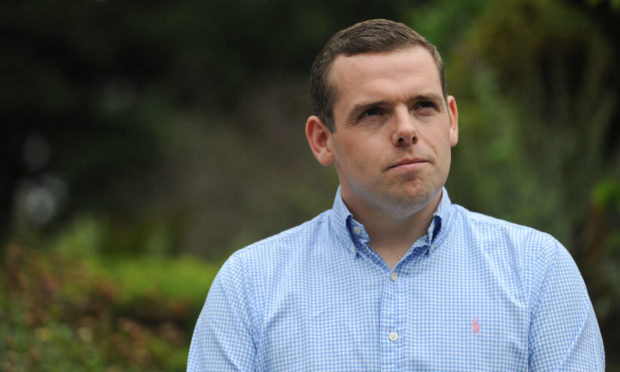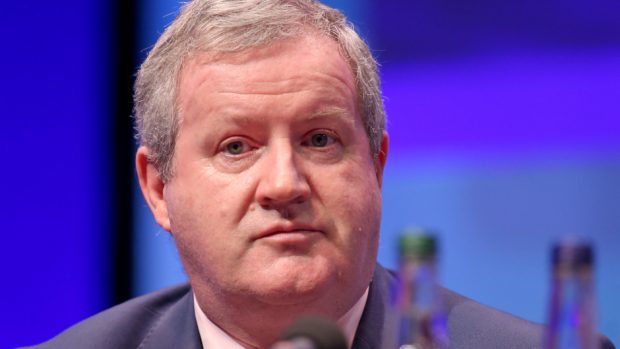Douglas Ross has called for major investment in road and rail across Scotland as part of a wide-ranging economic recovery programme to help “turbocharge” the nation.
The strategy, being launched in Inverness on Monday, would involve a massive acceleration of infrastructure projects connecting Glasgow, Edinburgh, Aberdeen and Inverness, jointly funded and overseen by the UK and Scottish governments.
The long-term plans would see faster rail connections and an extended three-lane M8 between Glasgow and Edinburgh, with new population settlements in between, and alongside new industrial hubs.
A tourism infrastructure fund would also be created to improve travel for tourists and protect local roads in rural Scotland outside the central belt.
The Scottish Tory leader said the plans would see the creation of a “Scottish Dynamo” that could compete with the Northern Powerhouse and Midlands Engine.
The UK Government has started a trial in Lancashire with payments of up to £182 for people who have tested positive for Covid or been told they must isolate. I am calling for a trial of this payment in Scotland. This is an opportunity for our governments to work together. pic.twitter.com/PkgGocIjE6
— Douglas Ross MP (@Douglas4Moray) August 28, 2020
Mr Ross said: “The programme for government this week must focus on how we recover from this crisis, protect jobs and rebuild Scotland’s economy from the brink.
“It should be a programme to invest in infrastructure and connect communities across the country, leaving nowhere behind.
“Scotland has been too divided for too long, not only constitutionally but economically too. We need a massive acceleration of infrastructure projects to bring people across Scotland closer together.
“These proposals would better connect businesses across the country and boost productivity, delivering more money for public services and bringing more high-quality jobs to towns and cities that often get overlooked in favour of Edinburgh.”
He added: “We need to take power back from the government in Edinburgh and put power in the hands of people and communities across Scotland. We can do that by making it just as easy and attractive for a business to set up in Inverness as in Glasgow.
“We need a long-term strategic vision but it must begin now. We cannot wait any longer to plan a stronger Scottish economy. With both our governments pulling together, Scotland can build back better.”
Also proposed is a government fund for businesses facing localised coronavirus lockdowns.

This would have helped cushion employment in Aberdeen in recent weeks where more than 5,000 jobs in 70 companies were at risk.
Mr Ross also wants an expansion of skills provision for the Covid-19 generation with a training guarantee for all young people up to age 18.
A new publicly funded network of “second chance centres” for adults without any qualification would allow them to re-enter education and boost their skillset.
The Scottish Government is set to announce its programme for government this week, with a focus on jobs and the economy.
Ahead of the announcement, SNP Westminster leader Ian Blackford warned the UK Government’s decision to end the furlough scheme in October was the “height of irresponsibility” and would “kick the legs away” from Scotland’s “capacity to recover”.
People, he argued, were contrasting the “very firm” leadership of Nicola Sturgeon during the pandemic with Mr Johnson’s “u-turn after u-turn”.
He said: “I expect and understand that Boris Johnson had a desire to be prime minister, but I’m not convinced that he’s got the character and he has what it takes to be prime minister at a time of crisis such as this and I think he’s been woefully exposed.”
There were, he said, “significant challenges” with stopping furlough, warning “many businesses are going to see three winters”.
He said: “To see its demise too early when the economy’s not in a position to deal with the adjustments that have to be made is the height of irresponsibility.”
Mr Blackford cautioned against “repeating the mistakes” of the “massive rise” in unemployment during Margaret Thatcher’s first term in power.
He added: “If we don’t extend the furlough scheme as is required and this has to be done on a basis of need, then we’re going to put ourselves in a position that we’re going to have a material rise in unemployment that we could have avoided.”

